Dr. Nicole Apelian, a renowned biologist and survival expert, shares her extensive knowledge in the Wilderness Long-Term Survival Guide, offering practical skills for thriving in nature.
About Nicole Apelian
Dr. Nicole Apelian is a biologist, herbalist, and survival skills expert with decades of experience in wilderness survival. She gained widespread recognition for her 57-day solo survival on Vancouver Island during the History Channel’s reality TV show Alone. Nicole’s expertise spans wilderness survival, herbalism, and teaching others how to thrive in nature. She holds a strong passion for sharing forgotten skills that enable individuals to live sustainably off the land. Her background includes extensive research and hands-on practice in herbal medicine, foraging, and bushcraft; Nicole’s unique blend of scientific knowledge and practical experience makes her a trusted authority in the field of wilderness survival. Through her guides and teachings, she empowers people to connect with nature and prepare for unexpected challenges.
Purpose of the Guide
The primary purpose of Dr. Nicole Apelian’s Wilderness Long-Term Survival Guide is to equip individuals with the essential skills and knowledge needed to survive and thrive in the wild for extended periods. Unlike short-term survival guides, this comprehensive resource focuses on sustainable living in nature, covering topics such as water procurement, shelter building, fire starting, and foraging for wild foods. Nicole aims to empower readers with practical, actionable strategies that go beyond basic survival techniques, emphasizing long-term sustainability and self-reliance. The guide is designed for anyone interested in wilderness survival, from beginners to experienced outdoor enthusiasts. By sharing her expertise, Nicole seeks to help people connect with nature and prepare for unexpected challenges, ensuring they can stay safe and healthy in the wild. This guide serves as a valuable resource for those seeking to master the art of living off the land.
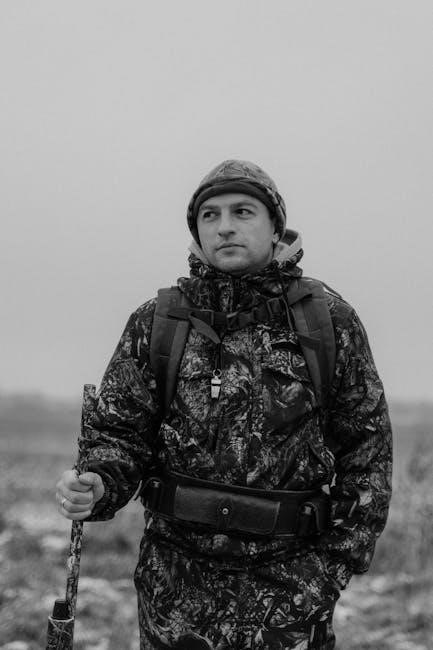
Essential Survival Skills
Mastering water procurement, shelter building, and fire starting are fundamental for wilderness survival. These skills, outlined in Nicole Apelian’s guide, ensure sustainability and safety in the wild, forming the foundation for long-term survival.
Water Procurement
Water procurement is a critical aspect of wilderness survival, as access to clean drinking water is essential for sustaining life. In her guide, Nicole Apelian emphasizes the importance of identifying reliable water sources, such as streams, ponds, and springs. She also provides techniques for purifying water using natural methods like solar disinfection and sand filtration. Additionally, Apelian shares insights on collecting dew and rainwater, ensuring individuals have multiple strategies to obtain hydration. Her expertise, honed through years of experience, equips readers with the practical skills needed to locate and purify water in challenging environments. By mastering these techniques, individuals can confidently secure a steady water supply, a fundamental step in long-term wilderness survival. Apelian’s approach ensures that even in remote areas, water procurement remains manageable and safe, enhancing overall resilience in the wild.
Shelter Building
Shelter building is a cornerstone of wilderness survival, providing protection from harsh weather conditions and wildlife. Nicole Apelian’s guide outlines effective techniques for constructing shelters using natural materials like leaves, branches, and snow. She emphasizes the importance of selecting a safe location, such as a spot with natural windbreaks or drainage. Apelian also teaches how to build various types of shelters, including lean-tos, debris huts, and snow shelters, each suited to different environments. Her methods highlight the use of readily available resources to create durable structures. By mastering these skills, individuals can ensure they have a reliable place to rest, protecting themselves from the elements and maintaining energy for other survival tasks. Apelian’s approach makes shelter building accessible, even for those with limited experience, ensuring safety and comfort in the wild.
Fire Starting
Fire starting is a fundamental skill in wilderness survival, providing warmth, light, and a means to cook food. Nicole Apelian’s guide offers practical methods for igniting fires using natural materials like flint, steel, and tinder. She emphasizes the importance of selecting dry, combustible materials and creating a fire pit or ring to contain the flames. Apelian also covers alternative techniques, such as using solar fire starting with magnifying glasses or clear plastic water bottles. Her instructions are tailored for varying environmental conditions, ensuring that readers can start a fire even in damp or windy settings. By mastering these techniques, individuals can maintain morale, stay warm, and prepare nutritious meals, all of which are critical for long-term survival. Apelian’s approach ensures that fire starting remains a reliable and essential tool in any wilderness scenario.
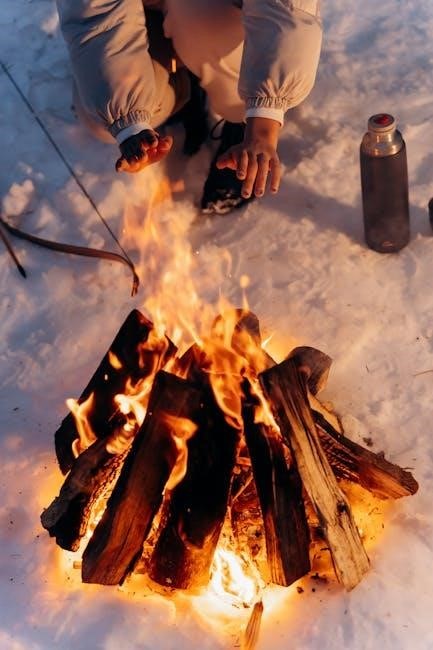
Herbalism in Wilderness Survival
Nicole Apelian’s guide highlights the importance of herbalism, teaching how to identify and use medicinal plants for health and wellness in the wild, enhancing survival capabilities naturally.
Making Medicinal Plants Work for You
Nicole Apelian’s guide emphasizes the power of herbalism, teaching how to identify and utilize medicinal plants for survival. She explains how to create natural remedies for wounds, pain, and common illnesses, ensuring safety and effectiveness. By understanding plant properties, individuals can harness their healing potential, transforming wild resources into life-saving treatments. This section focuses on practical applications, such as infusions, salves, and tinctures, making herbalism accessible for everyone. Apelian’s expertise bridges traditional knowledge with modern survival needs, offering a sustainable approach to health in the wilderness. Her detailed instructions and diagrams provide clarity, enabling readers to confidently use plants for medicinal purposes, ensuring well-being during extended stays in nature. This knowledge is crucial for self-reliance and resilience in remote environments.
Edible Plants for Sustenance
Nicole Apelian’s guide provides a comprehensive overview of edible plants, essential for long-term wilderness survival. She identifies over 400 plants, detailing their safe identification, nutritional value, and preparation methods. This knowledge enables individuals to sustain themselves without reliance on stored food, a critical skill for extended wilderness stays. Apelian emphasizes sustainable foraging practices to avoid depleting natural resources. Common edible plants like dandelion, wild garlic, and berries are highlighted for their accessibility and nutritional benefits. Safety is a priority, with warnings about poisonous lookalikes and proper preparation techniques. Nicole’s expertise, honed from her 57-day survival on Vancouver Island, ensures practical and reliable guidance. By mastering edible plants, survivors can maintain energy and health, crucial for enduring the challenges of the wild. This section is a cornerstone of her guide, empowering readers to thrive in nature.
Natural Remedies for Common Ailments
Nicole Apelian’s guide highlights natural remedies for common ailments, leveraging her expertise in herbalism. She details how to use wild plants for treating injuries, pain, and infections, essential for wilderness survival. Plants like plantain for skin irritations and willow bark for pain relief are showcased. Apelian’s experience on Vancouver Island informs her practical approaches to using nature for healing. She emphasizes sustainable harvesting and safe preparation to avoid adverse effects. This section empowers readers to rely on natural resources for health, reducing dependence on modern medicine. By mastering these remedies, individuals can address common issues effectively, enhancing their ability to thrive in remote environments. Nicole’s holistic approach bridges traditional knowledge with modern survival needs, making it invaluable for long-term wilderness living.

Food Procurement
Nicole Apelian’s guide covers sustainable foraging, hunting techniques, and food preservation methods, ensuring a steady supply in the wilderness for long-term survival.
Foraging for Wild Foods
Foraging for wild foods is a cornerstone of wilderness survival, and Dr. Nicole Apelian’s guide provides an in-depth look at how to identify and utilize edible plants safely. She emphasizes the importance of proper identification to avoid poisonous species and highlights plants that are both nutritious and abundant. The guide covers over 400 plants, detailing their seasonal availability and how to prepare them for consumption. Apelian also shares tips on recognizing universal edibles, such as dandelion, plantain, and wild berries, which can be found in many environments. By mastering these skills, individuals can sustain themselves in the wild, ensuring a steady food supply. Apelian’s expertise in herbalism and survival shines through, making foraging accessible even for beginners. This knowledge is vital for anyone aiming to thrive in nature, whether for a few days or an extended period.
Hunting and Trapping
Hunting and trapping are essential skills for obtaining protein-rich food in the wilderness, as detailed in Dr. Nicole Apelian’s guide. She covers various trapping methods, such as snares and pitfalls, to catch small game like rabbits and birds. Apelian also discusses hunting strategies, including the use of bows and spears, emphasizing ethical and sustainable practices. The guide provides insights into tracking animals and understanding their behavior, which is crucial for successful hunting. Additionally, she addresses the importance of safety and legal considerations when using firearms or other hunting tools. By mastering these techniques, individuals can secure a reliable food source, ensuring long-term survival in remote areas. Apelian’s expertise bridges traditional methods with modern practicality, making hunting and trapping accessible for both novices and experienced outdoorsmen.
Preserving Food for the Long Term
Preserving food is a critical skill for long-term wilderness survival, as emphasized in Dr. Nicole Apelian’s guide. She highlights methods like smoking, drying, and fermenting to extend the shelf life of wild edibles. These techniques not only prevent spoilage but also retain nutritional value. Apelian provides detailed instructions on how to properly prepare and store food, ensuring safety and sustainability. Her guide covers the importance of understanding food preservation to avoid contamination and waste. By mastering these traditional methods, individuals can maintain a steady food supply, even in remote and resource-limited environments. Apelian’s expertise ensures that these techniques are both practical and effective, making long-term survival more achievable. Her approach blends ancient wisdom with modern practicality, offering a comprehensive resource for wilderness food preservation.
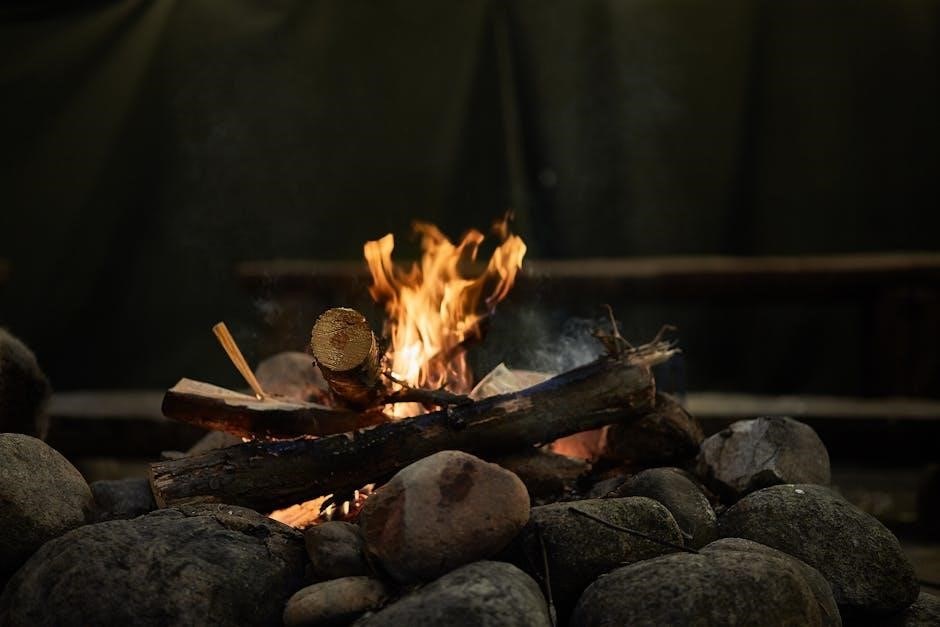
Navigation and Orientation
Mastering navigation is essential for wilderness survival. Dr. Nicole Apelian teaches how to read natural signs, use celestial navigation, and effectively employ tools like compasses and maps to stay oriented and conserve energy.
Reading Natural Signs
In the wilderness, understanding natural signs is crucial for survival. Nicole Apelian emphasizes observing patterns in nature, such as the direction of tree growth, moss coverage, and animal tracks. These indicators can guide you to water sources or safer terrain. Recognizing changes in vegetation, like willows near streams, helps locate essential resources. Apelian also highlights the importance of celestial navigation, using the sun and stars to determine direction. Additionally, she teaches how to interpret weather signs, such as cloud formations, to predict storms. By mastering these skills, one can navigate effectively without modern tools, ensuring safety and resourcefulness in the wild.
Using Navigation Tools Effectively
Nicole Apelian’s guide emphasizes the importance of mastering navigation tools to stay oriented in the wilderness. A compass is a essential tool, but it’s crucial to know how to use it correctly. Always hold the compass steady, ensure the needle is free to rotate, and align the direction-of-travel arrow with your intended path. Apelian also highlights the value of creating mental or physical landmarks to track your route. Additionally, carrying a whistle as a backup signaling device can be lifesaving. Understanding how to use these tools effectively ensures you can navigate confidently, even in unfamiliar terrain. Preparation and practice are key to avoiding disorientation and staying safe in the wild.
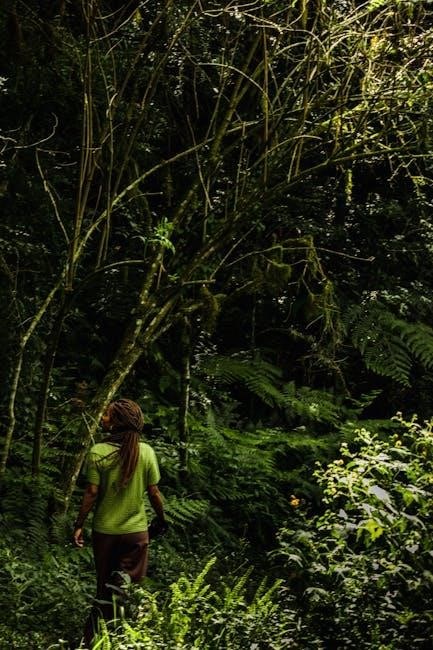
Mental and Physical Resilience
Mental and physical resilience are crucial for wilderness survival. Nicole Apelian emphasizes staying positive, building physical stamina, and perseverance to overcome challenges. Her experience on Vancouver Island exemplifies these principles.
Maintaining a Positive Mindset
Maintaining a positive mindset is essential for wilderness survival, as it fuels resilience and decision-making. Nicole Apelian teaches that staying optimistic, even in harsh conditions, helps preserve mental energy. She emphasizes gratitude, focusing on available resources rather than limitations. Mindfulness practices, such as connecting with nature, can reduce stress and enhance clarity. Nicole’s experience on Vancouver Island demonstrates how mental fortitude is as vital as physical skills. Cultivating a growth mindset allows individuals to adapt and learn from challenges, fostering confidence and determination. By reframing obstacles as opportunities, survivors can navigate adversity with renewed strength. Nicole’s guide provides practical strategies to nurture mental well-being, ensuring a balanced approach to long-term wilderness survival.
Keeping Your Body Healthy
Keeping your body healthy is crucial for long-term wilderness survival. Nicole Apelian emphasizes the importance of proper nutrition, hydration, and physical activity. She recommends foraging for nutrient-rich wild foods and ensuring a balanced diet to maintain energy levels. Regular exercise, such as walking or strength training, helps sustain physical endurance. Hygiene practices, like washing hands and cleaning wounds, prevent infections. Nicole also highlights the need for adequate sleep and rest to allow the body to recover. By prioritizing physical health, individuals can build resilience and withstand the demands of living in the wild. Nicole’s guide offers practical tips to maintain bodily well-being, ensuring survival and thrival in challenging environments.
Nicole Apelian’s Experience on Alone
Dr. Nicole Apelian survived 57 days on Vancouver Island, demonstrating her wilderness skills, resilience, and ability to thrive in harsh conditions during her time on the show Alone.
Challenges Faced on Vancouver Island
During her 57-day stay on Vancouver Island for the TV show Alone, Dr. Nicole Apelian encountered numerous challenges, including harsh weather, limited resources, and the physical demands of surviving in a remote wilderness. Despite her expertise, she faced difficulties such as building and maintaining shelter, sourcing clean water, and procuring food in a densely forested and wet environment. The island’s rugged terrain and unpredictable weather added to the complexity of her survival journey. Additionally, managing her multiple sclerosis diagnosis in such a challenging setting required immense mental and physical resilience. Her ability to adapt and utilize her knowledge of natural resources was crucial in overcoming these obstacles, showcasing her deep understanding of wilderness survival techniques and herbalism. These challenges highlighted her remarkable determination and resourcefulness in one of the most demanding environments imaginable.
Survival Skills Demonstrated
Dr. Nicole Apelian showcased exceptional survival skills during her 57-day challenge on Vancouver Island, demonstrating her mastery of wilderness expertise. She effectively utilized foraging techniques, identifying edible plants and berries to sustain herself, while also showcasing her knowledge of medicinal herbs for health maintenance. Her ability to construct a durable debris hut and start fires in challenging conditions highlighted her practical skills. Apelian also demonstrated resourcefulness in adapting to the island’s environment, such as using natural materials for tools and clothing. Her expertise in herbalism was evident as she used plants to treat ailments, ensuring her physical well-being. Additionally, her mental resilience and ability to stay focused under pressure were key to her survival. These skills, shared in her guide, inspire others to embrace wilderness living with confidence and preparedness. Her performance underscored her deep connection with nature and her ability to thrive in extreme conditions.
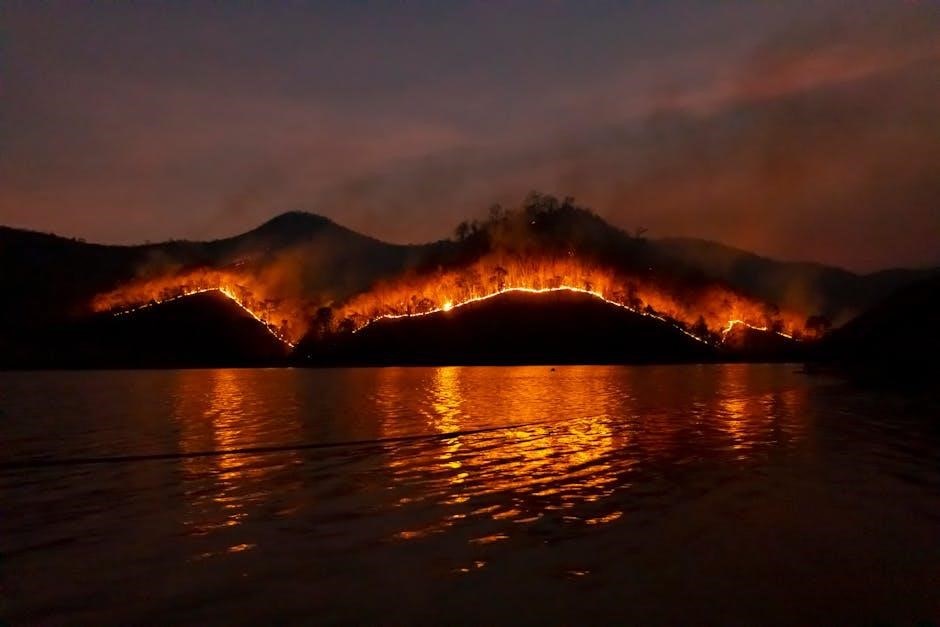
Safety Tips and Best Practices
Nicole Apelian emphasizes preparedness, awareness of surroundings, and proper gear use to avoid hazards. Her guide teaches readers to stay informed and adapt to wilderness challenges effectively always.
Avoiding Wilderness Hazards
Dr. Nicole Apelian’s guide emphasizes recognizing and avoiding potential dangers in the wild, such as wildlife encounters, inclement weather, and treacherous terrain. She stresses the importance of staying alert and using navigation tools effectively to prevent disorientation. Understanding natural signs, like animal tracks or changing weather patterns, is crucial for anticipating risks. Additionally, she advises carrying essential gear, such as a first-aid kit and a reliable means of starting a fire, to address unexpected challenges. Avoiding hazardous areas, like steep cliffs or fast-moving rivers, requires careful planning and observation. Nicole also highlights the importance of maintaining a safe campsite, including proper food storage to deter wildlife. By combining these strategies, individuals can minimize risks and enhance their safety in the wilderness. Her expertise, honed from years of experience and her time on Alone, provides a comprehensive approach to avoiding hazards and staying secure in nature.
Preparing for Survival Situations
Dr. Nicole Apelian’s guide underscores the importance of preparedness for survival situations, highlighting key strategies to ensure safety and self-reliance in the wilderness. She advocates for developing a resilient mindset, as mental fortitude is crucial for overcoming challenges. Nicole emphasizes the need to carry essential tools, such as a knife, water filter, and fire starter, which are vital for addressing basic needs. Additionally, she stresses the importance of learning fundamental skills, like water procurement and shelter building, before venturing into the wild. Understanding how to navigate using natural signs and compasses is also a critical aspect of preparation. Nicole’s guide encourages individuals to practice these skills regularly to build confidence and proficiency. By combining knowledge, practical experience, and the right equipment, anyone can enhance their ability to thrive in survival scenarios. Her expertise, gained from years of wilderness experience and her time on Alone, provides a comprehensive roadmap for readiness.